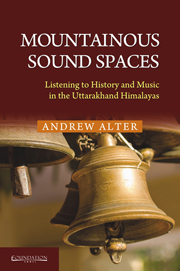Book contents
- Frontmatter
- Contents
- List of Figures
- List of Tables and Musical Examples
- Preface
- Acknowledgements
- Introduction
- 1 Echoes of Colonialism: Bagpipes in the Himalayas
- 2 Echoes of a Royal Heritage: Vestiges of Naubat
- 3 Possession and Performance: Sounding Out the Epic Worlds of Heroes and Gods
- 4 Worlds of Sound: Revisiting the Parameters of Oral Tradition
- 5 Flutes, Sprites and Mountainous Geographies
- 6 Drum Strokes, Syllables and Rhythmic Patterns
- 7 The Significance of Tantric Sects for Drum Practice in the Central Himalayas
- 8 Playing History: Sounding Out the Epic Worlds of Heroes and Gods
- 9 The Legacy of Garhwali Cassettes: Remembering the Pre-digital Age of Music Commodification
- Epilogue: Listening to an Uttarakhandi Himalayan Space
- Bibliography
- Index
4 - Worlds of Sound: Revisiting the Parameters of Oral Tradition
Published online by Cambridge University Press: 05 October 2014
- Frontmatter
- Contents
- List of Figures
- List of Tables and Musical Examples
- Preface
- Acknowledgements
- Introduction
- 1 Echoes of Colonialism: Bagpipes in the Himalayas
- 2 Echoes of a Royal Heritage: Vestiges of Naubat
- 3 Possession and Performance: Sounding Out the Epic Worlds of Heroes and Gods
- 4 Worlds of Sound: Revisiting the Parameters of Oral Tradition
- 5 Flutes, Sprites and Mountainous Geographies
- 6 Drum Strokes, Syllables and Rhythmic Patterns
- 7 The Significance of Tantric Sects for Drum Practice in the Central Himalayas
- 8 Playing History: Sounding Out the Epic Worlds of Heroes and Gods
- 9 The Legacy of Garhwali Cassettes: Remembering the Pre-digital Age of Music Commodification
- Epilogue: Listening to an Uttarakhandi Himalayan Space
- Bibliography
- Index
Summary
Most pawāṙās incorporate stories of heroic protagonists like Dhama Deb and Pithima Deb. This is why the genre term pawāṙā is largely synonymous with vīr-gāthā (hero epic). While the etymologies of the two terms are different, they both identify genres of performance in which heroic tales are ‘sung’. The term vīr-gāthā emphasizes the sung nature of these stories through the root verb ‘gānā’ – ‘to sing’. In addition, the term pawāṙā may be etymologically linked to immigrant Rajputs named ‘Panwar’ like king Ajay Pal who was from the Panwar family.
A further significant fact related to all pawāṙā performances, is their existence as a tradition of oral practice. Consequently, the pawāṙās discussed in various places in this book illustrate patterns and themes that are characteristic of oral tradition. Unlike some areas of the world where written/printed versions of stories interact with traditions of oral performance, in Uttarakhand, if published versions of pawāṙās exist, they are frequently the result of direct transcription from oral practice. As far as I am aware, huṙkiyās who still perform in village locations today do not access or refer to written sources; nor do they maintain written records to aid their memory. Consequently, the scholarly field of ‘oral tradition’ provides a valuable theoretical framework to dig deeper into the sonic worlds of pawāṙās in Uttarakhand.
- Type
- Chapter
- Information
- Mountainous Sound SpacesListening to History and Music in the Uttarakhand Himalayas, pp. 48 - 64Publisher: Foundation BooksPrint publication year: 2014

